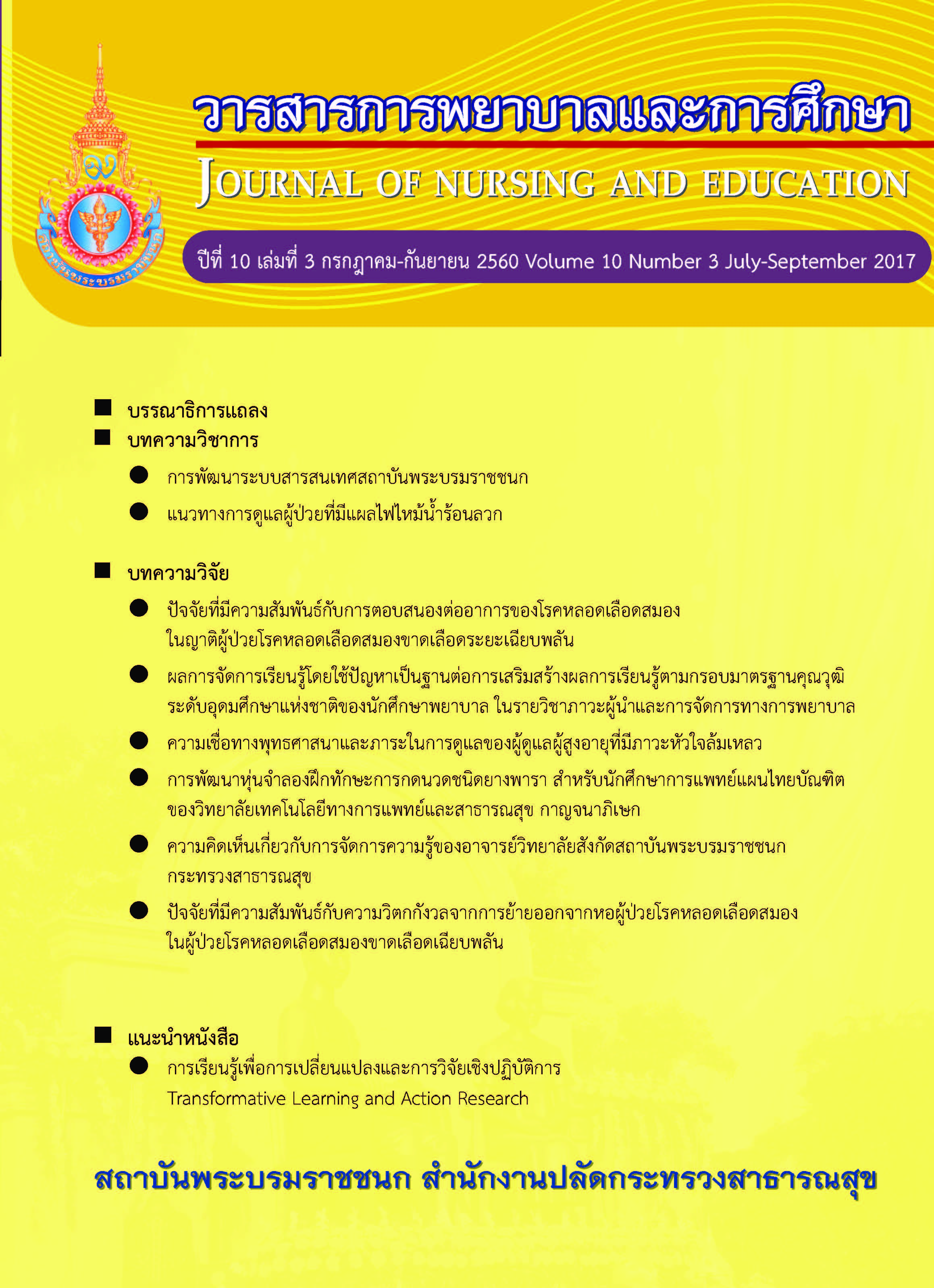ความเชื่อทางพุทธศาสนาและภาระในการดูแลของผู้ดูแลผู้สูงอายุ ที่มีภาวะหัวใจล้มเหลว
Buddhist Beliefs and Caregiving Burden Among Caregivers of Older Persons with Congestive Heart Failure
Abstract
บทคัดย่อ
ภาวะหัวใจล้มเหลว เป็นภาวะเจ็บป่วยเรื้อรังที่ทำให้ผู้สูงอายุมีข้อจำกัดในการช่วยเหลือตนเองและมีความต้องการการดูแลจากผู้ดูแลมากขึ้นเป็นผลให้ผู้ดูแลเกิดภาระในการดูแล การวิจัยแบบพรรณนาหาความสัมพันธ์นี้ มีวัตถุประสงค์เพื่อศึกษาภาระในการดูแลและความสัมพันธ์ระหว่างความเชื่อทางพุทธศาสนา ระดับความรุนแรงของภาวะหัวใจล้มเหลวและภาระในการดูแลของผู้ดูแลผู้สูงอายุที่มีภาวะหัวใจล้มเหลว กลุ่มตัวอย่างเป็นผู้ดูแลผู้สูงอายุที่มีภาวะหัวใจล้มเหลว จำนวน 88 ราย เก็บข้อมูลระหว่าง เดือน มกราคม ถึงเดือน มีนาคม พ.ศ. 2560 โดยใช้แบบสอบถามประกอบด้วย แบบสอบถามข้อมูลส่วนบุคคล แบบสอบถามภาระในการดูแลของผู้ดูแลผู้สูงอายุของ เฟื่องลดา เคนไชยวงศ์1 และแบบสอบถามความเชื่อทางพุทธศาสนาของผู้ดูแลที่ผู้วิจัยได้พัฒนาขึ้นที่มีค่าความเชื่อมั่นเท่ากับ 0.80 และ 0.82 ตามลำดับวิเคราะห์ข้อมูลโดยใช้สถิติเชิงพรรณนาและสถิติทดสอบสหสัมพันธ์แบบสเปียร์แมน
ผลการวิจัยพบว่าผู้ดูแลผู้สูงอายุที่มีภาวะหัวใจล้มเหลว มีคะแนนเฉลี่ยของระดับภาระในการดูแลโดยรวมอยู่ในระดับปานกลาง (=33.36, S.D.=4.29) และคะแนนเฉลี่ยของความเชื่อทางพุทธศาสนา อยู่ในระดับสูง (=77.70, S.D.=10.07) ความเชื่อทางพุทธศาสนาไม่มีความสัมพันธ์กับภาระในการดูแลในขณะที่ระดับความรุนแรงของภาวะหัวใจล้มเหลวในผู้สูงอายุ มีความสัมพันธ์ทางบวกในระดับปานกลาง(r=0.310, p<.01) กับภาระในการดูแลของผู้ดูแล
ผลการวิจัยครั้งนี้เป็นประโยชน์สำหรับผู้บริหารการพยาบาล ในการกำหนดนโยบายด้านการพยาบาลในการประเมินและติดตามภาระของผู้ดูแลและเป็นประโยชน์สำหรับพยาบาล ในการวางแผนการลดภาระในการดูแลของผู้ดูแลผู้สูงอายุที่มีภาวะหัวใจล้มเหลว
ABSTRACT
Congestive heart failure (CHF) is a chronic illness that limits the self- help ability of older persons and increases care needs from caregiver resulting in increased burden for caregivers. This correlationaldescriptive study aimed to describe caregiving burden and its correlation with Buddhist beliefs and the level of heart failure severity among caregivers of older persons with congestive heart failure. Participants were 88 caregivers of older persons with congestive heart failure purposively selected from those who met the inclusion criteria. Data were collected during January - March 2017 using questionnaires including the Demographic Data Recording Form, Kenchiwong’ s Older People Caregiving Burden Scale (1996) and the Buddhist Beliefs Questionnaire. Its reliability of instrument was 0.80 and 0.82 respectively. Data were analyzed using descriptive statistics and the Spearman correlation test.
The results showed that caregivers had a moderate burden level (=33.36, S.D.=4.29) and ranked high on their Buddhist beliefs (=77.70, S.D.=10.07). Buddhist beliefs was not significantly related to burden, while severity of heart failure was significantly positively related to caregiving burden(r=0.310, p <0.01).
The study results are beneficial for nurse administrators to set up nursing policy for caregiving burden assessment and for monitoring purposes for nurses who plan interventions to reduce the caregiving burden of CHF caregivers.
References
1. Kenchiwong, F. Relationships among patient dependency social support and burden of stroke patient cargivers. Master of nursing science in Medical Surgical Nursing. Chiang Mai: Chiang Mai University; 1996. (in Thai)
2. Yitong, M., Fen, L., Yining, Y., Xiaomei, L., Bangdang, C., & Ying, H. ASSA13-13-3
Investigation of prevalence and distributing feature of chronic heart failure in XinJiang adult population, 2013. [cited 2015 July 9]. Available from: http://heart.bmj.com/content/99/Suppl_1/A56.2
3. The Heart Association of Thailand under the Royal Patronage. Congestive heart failure guideline.1st ed. Bangkok: A plus print; 2014. (in Thai)
4. Toonsiri, C., Sunsern, R., & Lawang, W. Development of the burden interview for caregivers of patients with chronic illness. Journal of Nursing and Education, 2011; 4(1): 62-75.
5. Hwang, B., Fleischmann, K. E., Howie-Esquivel, J., Stotts, N. A., & Dracup, K.. Caregiving for
patients with heart failure: impact on patients’ families. American Journal of Critical Care, 2011; 20(6): 431-442.
6. Pearlin, L. I., Mullan, J. T., Semple, S. J., & Skaff, M. M. Caregiving and the stress process: An overview of concepts and their measures. The Gerontologist, 1990; 30(5): 583-594.
7. Lazarus, R. S., & Folkman, S. Stress, appraisal, and coping. New York: Springer; 1984.
8. Montgomery, R. J., Gonyea, J. G., & Hooyman, N. R. Caregiving and the experience of subjective and objective burden. Family Relations, 1985; 34 (1): 19-26.
9. Chou, K. R., Chu, H., Tseng, C. L., & Lu, R. B. The measurement of caregiver
burden. Journal of Medical Sciences-Taipei, 2003; 23(2): 73-82.
10. Payutto, P.A. Dictionary of Buddhism. 11thed. Bankkok: Sahadhmmika; 2002. (in Thai)
11. Polit.D.F.& Beck, C.T. Nursing research: Principle and methods. 7thed. Philadelphia: Lippincott Williams & Wilkins; 2004.
12. Jirojanakul, P. Nursing research: concepts, principles and practices. 2nd ed. Nonthaburi: Praboromrajchanok institute for health workforce development; 2005. (in Thai)
13. Pha Phumet Sumedho (Punsuwun). The Belief and Practices of Buddhists in Phachaw–Khawtu,Wat Suandok, Chiang Mai. Master of Arts (Buddhist Studies). Bangkok: Mahachulalongkornrajavidyalaya University, 2010. (in Thai)
14. Ngammoh, N. Wirojratana, V. Jitramontree, N. Relationship between Basic Factors, Religious Belief, Religious Practice, Perception of Life, and Gerotranscendence in End-Stage Chronic Renal Failure Patient . Thai Journal of Nursing Council, 2015; 30(1): 58-71. (in Thai)
15. Promawan, N. The faith in Buddhism of secondary school students in Bangkok. Pathumthani University Academic Journal, 2013; 5(2): 59-70. (in Thai)
16. Hooley, P. J., Butler, G., &Howlett, J. G.The relationship of quality of life, depression, and Caregiver burden in outpatients with congestive heart failure. Congestive Heart Failure, 2005; 6(11): 303-313.
17. Preechapongmit, K. Factor Related to Caregiving Burden among Caregivers of Children with Asthma. Nursing Journal, 2012; 39(4): 13-21. (in Thai)
18. Papastavrou, E., Kalokerinou, A., Papacostas, S. S., Tsangari, H., & Sourtzi, P. Caring for a relative with dementia: family caregiver burden. Journal of Advanced Nursing, 2007; 58(5): 446-457.
19. Elawam, A. E.. and Abdelrahman, H. M. Caregiver stress in partners of heart failure elderly patients. Middle East Journal of Age and Ageing, 2013; 10(4): 3-11.
20. Chaiyarit, A. Perceived Role Strain in Thai Family Caregivers of Heart Failure Patients.
(Unpublished doctoral dissertation). Michigan State University, 2012.






